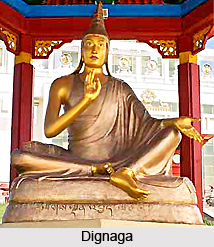 Dignaga (480-540 CE) was born into a Brahmin family in Simhavakta near Kanchipuram. He defended the view that a real kind of personality exists which is independent of the elements composing it. Dignaga totally annuls sensory perception and thoughts involving concepts and inference. There is no conceptualisation in sensory perception. Perception is a direct experience of objective reality that consists of a flux of unique and momentary particulars.
Dignaga (480-540 CE) was born into a Brahmin family in Simhavakta near Kanchipuram. He defended the view that a real kind of personality exists which is independent of the elements composing it. Dignaga totally annuls sensory perception and thoughts involving concepts and inference. There is no conceptualisation in sensory perception. Perception is a direct experience of objective reality that consists of a flux of unique and momentary particulars.
Perception is indescribable as they do not share any common features. The categories that the Nyaya-Vaiseshika realists claim to find in the world are imposed by the minds.
Conceptual thought and language dealt generally. Simple concepts have no objective general features. They are causally related to the realities and arbitrary fictional inventions. There is a gap between how the minds work and the way things are at. Thought and language cannot be separated. Conceptual thought is born out of language and language is again born out of concepts. Interpretation of sensory impressions is through conceptual construction. Unique particulars are grouped together and it is understood as continuing objects bearing types of assets.
Dignaga inherits the terms svalakshana and Samanya and lakshana from the Abhidharma tradition. Svalak-sbana is an individual basic atomic factor as it is in itself. It means the common features to dharmas when their combinations produce trained formations. Non-eternity, unsatisfactoriness and lack of permanent identity are included in such generalities. The notion of the unique instant particular is modeled on the Abhidharma notion of dharma, however rejects their view that each atomic factor has an unchanging essence. He has paid a considerable contribution to the theory of inference.
Dignaga was an indirect student of Vasubandhu. Aspects of Yogachara and Sautrantika theories of perception were combined with his own innovative logical methodology. He has written a number of books on Abhidharma and Pramana. The work deals with the problems regarding sense-perception and its role in knowledge, knowledge reliability and the relationship between sensations, images, concepts, and the external world. His Pramana-samuccaya is a work that laid the foundations of Buddhist logic. He defined perception in anew manner. He regarded only pure sensation as perception. In his inference theory he distinguished between inference for oneself and inference for the other. His Hetucakra was his first work on formal logic. It is a bridge between the older doctrine of trairuupia and Dignaga`s own later theory of vyaapti. He had introduced a new form of deductive reasoning. Other works include The Treatise on the Objects of Cognition and The Treatise on the Correct Principles of Logic which were written in an effort to establish the valid sources of knowledge.



















